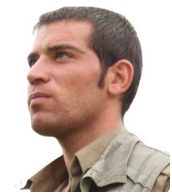
November 26, 2015
November 11th marks the anniversary of the execution of Ehsan Fattahian, a Kurdish activists and freedom fighter arrested by the Iranian regime. Ehsan’s life was noteworthy, particularly because of his defiance against the Iranian regime, and his dedication to the struggle for the freedom of Kurds and all Iranians. His legacy is significant as a representation of the sacrifices made by those who stand up to this regime and put their ideals and beliefs before their own self preservation.
Fattahian was arrested in 2008, for his membership in the Kurdish opposition organization Komala, and was subject to torture and threats while imprisoned. According to Amnesty International, Fattahian was denied access to an attorney during his trial, and sentenced to death for ‘waging war against God’. He was denied the right to appeal his death sentence, in contravention to international law, reportedly because he refused to provide a televised confession denouncing his beliefs.
Fattahian was executed on November 11, 2009, his body was never returned to his family and was buried secretly in Kermanshah, before the family was notified.
Despite the fact that he denied the charges against him, Fattahian should be remembered as a Kurdish militant and activist, who did not hesitate to take up arms to fight for the dignity and freedom of his people. Ehsan represented what the regime in Tehran fears the most: a young person with ideology, courage, and the commitment to stand against the fascist regime in Iran.
The story of Ehsan Fattahian is like that of many other Iranian freedom fighters, standing tall and unrepentant in the face tyranny and death. Fattahian remained steadfast until his last days, and maintained not only his dignity, but defiance toward the injustice imposed by the Iranian regime. In one of his last statements he said:
I never feared death. Even now, as I feel its odd and honest presence next to me, I still want to smell its aroma and rediscover it. Death has been the most ancient companion of this land. I don’t want to talk about death. I want to question the reasons behind it. Today, when punishment is the answer for those who seek freedom and justice, how can one fear his fate? Those of “us” who have been sentenced to death by “them” are only guilty of seeking an opportunity for a better and fair world. Are “they” also aware of their deeds?
Hamid Yazdan Panah is an Iranian-American human rights activist and attorney focused on immigration and asylum in the San Francisco Bay Area.

